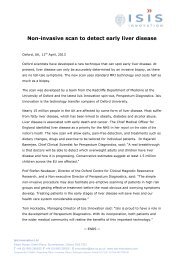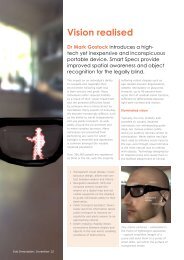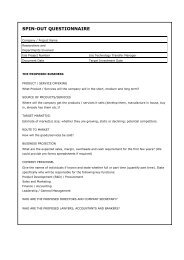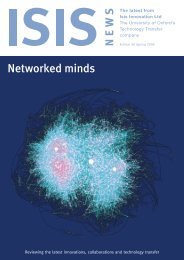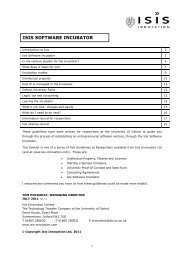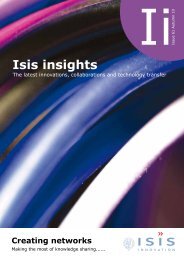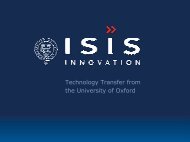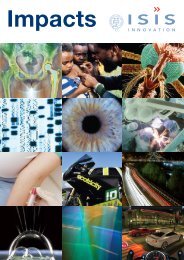CLIMATE CHALLENGE - Isis Innovation
CLIMATE CHALLENGE - Isis Innovation
CLIMATE CHALLENGE - Isis Innovation
- No tags were found...
You also want an ePaper? Increase the reach of your titles
YUMPU automatically turns print PDFs into web optimized ePapers that Google loves.
Managing funding awardsPoints and pitfalls<strong>Isis</strong> Enterprise advises medical research charities on how to structure grant funding awards tomeet their needs. The following is an edited version of an article written for the Association ofMedical Research Charities newsletter.Getting the grant funding agreement right is the foundationof a successful funding relationship, says <strong>Isis</strong> Enterprise’sDr Paul Whyte.The scope of the funded research and expected timelines areimportant here: “Making sure you have adequate reportingclauses at this stage will make your life a whole lot easierdown the line, as it will ensure you get the right kind ofinformation when you need it.”Whyte warns that multiple funding sources can also trippeople up. “How will the project meet the needs of each ofthe stakeholders?” It may be worth the consortium of fundersagreeing on a common framework to manage their interests.Some other questions to keep in mind are: “Do weneed a share of any commercial benefits arising from theresearch with other parties?; “If so, who will look aftercommercialisation?”; and “do we want to publicise anypublic benefit which might result?”Another useful tip is to consider staged payments linked toresearch milestones and reports that confirm completion ofthe work.Getting the management and the agreement right is thebest strategy for avoiding disputes. Nonetheless, theagreement should include an explicit dispute resolutionprocess, generally beginning with the project managers atan informal level and escalating to management.Once the ink is dry on the agreement, funding bodies mightwant to consider allocating a ‘project manager’ to monitorongoing research and manage the relationship. “The projectmanagement requirements should reflect your needs,” saysWhyte. “If you only need a once-yearly report, projectmanagement will be minimal. With a very large award fortranslational research, management of timelines, deliverablesand outcomes will require a more detailed reportingstructure, tighter management and ultimately more projectmanagement resources.” The organisation’s intellectualproperty policy is the foundation of a good commercialisationprocess. All institutions should have a clear policy, andcommunicate with their researchers about revenue-sharing,reasonable delays in publication to allow patent filing andrewards due on successful commercialisation.Dos and don’tsDo establish a clear plan detailing what you areproviding funding for, and a policy on how to do thisDo have a standard agreement that anticipates how youwill manage the relationshipDo reflect the basis of the relationship, expectations andresponsibilities clearly in the agreementDo include adequate reporting clausesDon’t assume everything is ok if you have not heardfrom the grant receiver – establish regular contact andreporting guidelinesDo establish policies for rewarding researchersDon’t assume that no management time/resource isrequired to manage the relationshipDo make sure there is a process for capturing andprotecting any IPDo clarify who is responsible for the cost of patents andcommercialisationDo consider what IP is likely to arise from the research,what background IP exists and how this might all bepackaged to meet the needs of a future commercialpartner.contactDr Paul WhyteBusiness Development Manager, <strong>Isis</strong> EnterpriseT 01865 280848E paul.whyte@isis.ox.ac.ukW www.isis-innovation.com22



